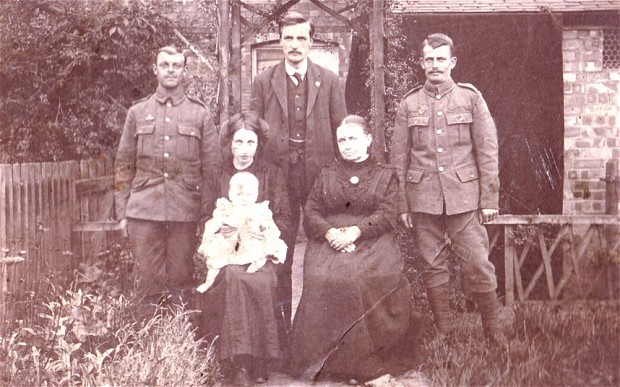The German soldier who had killed another man, fulfilled that man’s dying wish. The wish was for a photograph that he was found holding to be returned to his family. This is just one of the stories that marked the centenary of the First World War.
Sergeant Percy Buck clung to a black and white photograph of his wife, Bertha, and young son, Cyril, as he lay in a shell hole, slowly dying from a fatal wound in 1917.
On the back of the photograph, he wrote his address and a message for whomever found the photo to send it back to his loved ones in the event of his death.
Sergeant Buck assumed that it would be a fellow British soldier who would return the photo to his family. Instead, it was a German soldier who returned the photo. Gefreiter Josef Wilczek may have been the very soldier who fired the shots who killed Sgt. Buck.
In an act of humanity, Gefr Wilczek sent the photograph to the Red Cross in Geneva along with a note. In the note, he wrote:
“He was holding the card in his hand and the finder was asked to forward it to his wife. I, wishing to fulfil the last will of the dead comrade, send it to you.
“May he rest in peace.”
But by carrying out the soldiers final wish, Gefr. Wilczek may have deprived Sgt. Buck of a war grave for his family to pay respects to. The photograph would have been the identifying item that could have helped identify his body. It is believed that Sgt. Buck was buried in an unmarked grave somewhere in Flanders.
The Telegraph shares another sad twist to this tale, Gefr Wilczek didn’t survive the war. He was killed on October 31, 1918—only two weeks before the Armistice.
Now, Sgt. Buck’s granddaughter, Christina Reynolds, has discovered the letter the German sent to her grandmother, along with the devastating telegram that informed her of her husband’s demise.
Part of the emotive archive that has come to light almost 100 years later is the photograph of Sgt. Buck with his wife and son was taken on the same occasion as the one that was returned to them.
Upon finding the documents, Mrs Reynolds, from Hitchin, Hertfordshire, showed them to the newly-formed Herts at War project, set up to mark the 100th anniversary of the start of World War I.
Mrs Reynolds, whose late father Cyril was aged three when his father died, said: “My father barely knew his father but he had these items in a box.
“The box has been passed down to me and in it were these letters by the German soldier and the Red Cross explaining the return of the photo to my grandmother in 1917.
“It was this German soldier who probably killed my grandfather in an act of war.
“He didn’t have to take the time out and maybe risk punishment to fulfil my grandfather’s wishes. He could have left it there.
“The two men didn’t know each other but it was very kind of him to do what he did for a fellow soldier.”
Sgt Buck served in the Hertfordshire Regiment and trained troops in rifle practice before being sent to the Western Front in December 1916.
In July 1917 the men took part in a major dawn offensive in the Third Battle of Ypres, otherwise known as Passchendaele.
The night before the men went over the top, Sgt Buck wrote the request on the back of the photo and showed it to a colleague.
The next morning his battalion were at St Julien at Flanders and came under heavy machine gun fire which caused them to conduct a fighting withdrawal.
Sgt Buck was shot in the side and fell into the shell hole.
Mrs Reynolds, 58, said until now the family did not know how Sgt Buck had died.
But as a result of her coming forward, researchers for the Herts at War team have uncovered an eye-witness account of his death.
In 1918, a Private Ramsell told the Enquiry Department for Wounded and Missing: “We went over the top together at St Julien front.
“I did not see him (Percy) hit but several other fellows did. He was hit in the side and fell into a shell hole. He was too severely wounded to move.
“He showed me a photo of his wife and child the night before. On the back of it he had written his wife’s address and the words ‘whoever finds this please forward’, or words like that.
“We never saw him again and his body was never found.”
Mrs Reynolds said: “All the family knew was that my grandfather was missing in action and then confirmed as killed in action.
“His body has never been found and we have never really known what happened to him until now.
“We still don’t know where he is, only that he is buried out there somewhere.
“I just wish my father was still alive today because he would have wanted to know.”
Sgt Buck was aged 26 when he was killed. His widow Bertha, who he married in 1912, died in 1962.
Dan Hill, of the Herts at War project, said: “We are covering 20,000 different stories and this one stood out because it was an incredible moment of humanity in the carnage of war.
“It was right in the thick of the action and this one German soldier took it upon himself to do a dying comrade this remarkable favor.”
